At the recent annual convention of Veterans for Peace, VFP Vice President Jerry Condon said “The US peace movement has been demobilized by disinformation on Syria.”
Disinformation and propaganda on Syria takes three distinct forms. The first is the demonization of the Syrian leadership. The second is the romanticization of the opposition. The third form involves attacking anyone questioning the preceding characterizations.
This article was first published at Counterpunch on 6 August 2016.
There is a recent article which exemplifies all three of these forms. It is titled “Anti-Imperialism and the Syrian Revolution” by Ashley Smith of the International Socialist Organization (ISO). It’s a remarkable piece of misinformation and faulty analysis. Because it is clear and well written, it is likely to mislead people who are not well informed on the facts regarding Syria. Hence the importance of critically reviewing it.
Technique 1: Demonize the enemy … “the Syrian regime and its brutal dictator”
Smith starts off posing the question: Are you with the Syrian revolution or the brutal Assad dictatorship? The way he frames it, it’s not a difficult choice: yay for the revolution!
Like these false options, Ashley Smith’s article is a fairy tale devoid of reality. His bias is shown as he criticizes the Left for ignoring “Assad’s massacre of some 400,000 Syrians”. Included in this death count are 100 – 150 thousand Syrian soldiers and allies. Ashley blames Assad instead of the armed opposition for killing Syrian soldiers!
Another example of false propaganda is the discussion of the chemical weapons attack that took place on August 21, 2013 in outer Damascus. Neoconservatives speak of this event as “proving” Assad’s brutality – “killing his own people” – as well as the “failure” of President Obama to enforce his “red line”. Ashley aligns with the neocons as he says “Barack Obama came under pressure to intervene militarily in Syria after the regime carried out a chemical weapons attack in a suburb of Damascus in 2013, but he backed a Russian-brokered resolution that protected Assad.”
In reality, the Damascus sarin gas attack was carried out by an opposition group with the goal of forcing the U.S. to directly attack the Syrian government. Soon after the event, Veteran Intelligence Professionals for Sanity issued a statement reporting “the most reliable intelligence shows that Bashar al-Assad was NOT responsible for the chemical incident”. Later on, Seymour Hersh wrote two lengthy investigations pointing to Jabhat al Nusra with Turkish support being culpable. Investigative journalist Robert Parry exposed the Human Rights Watch analysis blaming the Syrian government as a “junk heap of bad evidence”. In the Turkish parliament, Turkish deputies presented documents showing that Turkey provided sarin to Syrian “rebels”. A detailed examination and analysis of all fact based stories in online at whoghouta.blogspot.com. Their conclusion is that “The only plausible scenario that fits the evidence is an attack by opposition forces.”
Ashley Smith accuses the Syrian government of widespread torture. His main example is the case of Syrian Canadian Maher Arar who was arrested by US authorities in collusion with Canadian authorities, then rendered to Syria for interrogation in 2002. Arar was beaten during the initial weeks of his interrogation in Syria. After ten months imprisonment, Syrian authorities determined he was not a terrorist and sent him back to Canada. Arar received an official apology and $10 Million from the Canadian government.
The most highly publicized accusation of rampant torture and murder by Syrian authorities is the case of “Caesar”. The individual known as “Caesar” was presented as a defecting Syrian photographer who had 55,000 photos documenting 11,000 Syrians tortured by the brutal Assad dictatorship. At the time, among mainstream media only the Christian Science Monitor was skeptical, describing it as “a well timed propaganda exercise”. In the past year it has been discovered that nearly half the photos show the opposite of what is claimed. The Caesar story is essentially a fraud funded by Qatar with ‘for hire’ lawyers giving it a professional veneer and massive mainstream media promotion.
While western media routinely refers to Assad as a dictator, in fact he is elected and popular with the majority of Syrians. Although not wealthy, Syria was largely self-sufficient with a semi-socialist state apparatus including free health-care, free education and large industries 51% owned by the state. You do not see pervasive western fast food, banks, and other corporate entities in Syrian cities. In the wake of protests, the government pushed through reforms which ended the one party system. There are now political parties across the political spectrum. These are a genuine ‘moderate opposition’. The June 2014 election confirmed Assad’s popularity despite the denials of those who have never been there.
Technique 2: Romanticize the opposition … “the Syrian Revolution”
Ashley Smith echoes mainstream media which portrays the conflict as a “civil war” which began with peaceful democratic loving Syrian revolutionaries beaten by a brutal regime.
In reality there was a violent faction from the start. In the first protests in Deraa seven police were killed. Two weeks later there was a massacre of 60 security forces in Deraa. In Homs, an eye-witness recounted the situation: “From the start, the protest movements were not purely peaceful. From the start I saw armed demonstrators marching along in the protests, who began to shoot at the police first. Very often the violence of the security forces has been a reaction to the brutal violence of the armed rebels.” In the first two months, hundreds of police and security forces were killed.
Ashley and company listen to Americans and British citizens and mistakenly believe they are listening to real Syrians. Some of these people left Syria at age 3. Some of them have never lived in Syria. Thus you have fantasy portrayals such as “Burning Country: Syrians in Revolution and War”. A more realistic picture is given by a Syrian who still lives in Aleppo. He writes under the name “Edward Dark” and describes how he and his friends quickly regretted the take-over of Aleppo by armed groups in summer 2012. He describes one friend’s reaction as the reality was hitting home: “How could we have been so stupid? We were betrayed!”. And another says: “Tell your children someday that we once had a beautiful country, but we destroyed it because of our ignorance and hatred.” Edward Dark is a harsh critic of President Assad and Baath Party. He is also naive regarding the role of US Ambassador Robert Ford. But his description of early protesters and the arrival of armed opposition rings true and more authentic than the portrayal of Yassin-Kassab and Al Shami.
In fact many of the idealized “Syrian revolutionaries” promoted by the authors of “Burning Country” are trained and paid agents of the US and UK. The Aleppo Media Center which produces many of the videos is a US creation. The White Helmets which purport to be Syrian, independent and unarmed first responders are a creation of the US and UK. The banner boys from Kafranbel are another western funded operation. In her book about her time as Secretary of State, Clinton boasts of providing “training for more than a thousand activists, students, and independent journalists” (p. 464).
Why do the enemies of Syria create such organizations? Partly as a way to channel money and support to the armed opposition. Also to serve as propaganda tools to confuse the situation and generate support for the real goal: regime change. For example, White Helmets mostly work in areas dominated by the Syrian Al Qaeda. Unlike legitimate organizations such as the Red Crescent, they never work in areas controlled by the government. And they are also active on the propaganda front, continually pushing for US / NATO intervention via a “no fly zone”. The misinformation of Ashley Smith and ISO confuses unwitting people and helps the enemies of Syria in their drive for regime change.
In contrast with the romanticized delusions of Ashley Smith and the authors of “Burning Country”, the U.S. Defense Intelligence Agency gave an accurate assessment in August 2012:
“ EVENTS ARE TAKING A CLEAR SECTARIAN DIRECTION. THE SALAFIST, THE MUSLIM BROTHERHOOD AND AQI ARE THE MAJOR FORCES DRIVING THE INSURGENCY IN SYRIA.”
Technique 3: Attack Those who Question the Dogma … “You’re an Assad supporter!”
Ashley Smith does not criticize the NATO and Gulf states that are violating international law and the UN charter by funding and supplying a proxy army to attack Syria. Instead, he criticizes left groups who oppose the aggression. That is a sign of how far off track ISO is. They did the same thing regarding Libya and have evidently learned nothing from that disaster. Ashley Smith should go and tour Libya now to savor the “revolution” he promoted.
Ashley Smith’s theme with respect to Syria (peaceful popular uprising against brutal dictator) is the same theme promoted by neoconservatives and the mainstream media. When they encounter a different perspective, they cry out, “You are an Assad supporter!”. Never mind that many genuine progressives do not say that. What we say is that it’s for the Syrian people to determine their government, not foreigners.
Smith criticizes the British Stop the War coalition for having “adapted to Assad supporters” and for “giving a platform to allies of the dictatorship”, specifically “regime apologist Mother Superior Agnes Mariam”. Smith is misinformed on this issue also, but it is doubly revealing. In fact, Mother Agnes was hosted on the tour by Syria Solidarity Movement. When she was in London, she was invited to speak at a Stop the War rally. To his great discredit, the keynote speaker Jeremy Scahill, who is closely aligned with ISO, threatened to withdraw from the conference if Mother Agnes spoke. Scahill has done great journalistic work exposing Blackwater and Drone Warfare. However that does not excuse the complicity leading to blackmail regarding a Palestinian Lebanese nun who has shown immense courage in promoting reconciliation and peace in Syria. However, that action is typical of some misguided “socialist” groups, the Muslim Brotherhood and their allies. Mother Agnes was verbally attacked and abused by these groups throughout her tour, which otherwise met with great success. Mother Agnes has lived in Syria for over twenty years. She consistently says that Syria needs reform, but you don’t do that by destroying it.
Ashley Smith goes on to criticize the US Peace Council for recently sending a delegation to Syria and having the audacity to talk with “Assad and his henchmen”. He sounds like the right wing hawks who denounced Jane Fonda for going to North Vietnam in the 1970’s. Smith displays a dogmatic and closed-minded view; what kind of “international socialism” does he represent?
Smith criticizes Green Party candidates Jill Stein and Ajamu Baraka for “remaining silent about Putin’s and Assad’s atrocities”. This is another measure of how far off track the ISO is. They evidently are not aware of international law or they don’t care about it. The Assad government has a right to defend itself against terrorist attacks which are sponsored, funded and supplied by foreign governments.
Syria also has a right to request help from Russia and Iran. But with tunnel-vision dogma, Ashley Smith and ISO do not care. They seem to be supporting instead of opposing imperialist aggression, violations of international law, and the death and destruction these have led to.
Ashley disparages the Syrian government and people who have continued to fight against the forces of sectarianism promoted by NATO, Israel and the Gulf monarchies. Ashley and ISO would do well to send some people to see the reality of Syria. They would find it very different than their fevered imagination or what they have been led to believe by fake Syrians and Muslim Brotherhood dogmatists.
Genuine progressives are not “Assad supporters”. Rather, we are opponents of imperialist aggression and supporters of international law–which says it’s the right of Syrians to determine who leads them. That would mean real Syrians, not those raised in or paid by the West.
Ashley Smith’s Inaccurate Overall Analysis
Ashley Smith gives a very inaccurate analysis of the overall geopolitical situation in Syria and beyond.
He says “The US has been seeking a resolution that might push Assad aside, but that above all maintains his regime in power”. He goes on to say ‘U.S. policy from the beginning has been to preserve the core of Assad’s state.” Ashley believes “the U.S. has retreated in general from outright regime change as its strategy in the Middle East”.
This is absurd. In reality the US and allies Israel and Saudi Arabia have been pushing for ‘regime change’ in Syria for over a decade. In 2005 CNN host Christiane Amanpour expressed the situation bluntly:
“Mr. President, you know the rhetoric of regime change is headed towards you from the United States. They are actively looking for a new Syrian leader. They’re granting visas and visits to Syrian opposition politicians. They’re talking about isolating you diplomatically and, perhaps, a coup d’etat or your regime crumbling. What are you thinking about that?”
In 2007, Seymour Hersh wrote about the destabilization efforts in his article “The Redirection”.
In 2010, Secretary of State Clinton spoke of “changing Syria’s behavior” and threatened “President Assad is making decisions that could mean war or peace for the region …. We know he’s hearing from Iran, Hezbollah and Hamas. It is crucial that he also hear directly from us, so that the potential consequences of his actions are clear.”
Secretary Clinton appointed Robert Ford to become US Ambassador to Syria. Ford was previously the chief political officer in Baghdad for Ambassador John Negroponte. Who is John Negroponte? He was Ambassador to Honduras overseeing the Nicaraguan Contras and El Salvador death squads in the 1980’s. Negroponte’s arrival in Iraq in 2004 led to ‘the El Salvador option’ (sectarian death squads) in Iraq.
Since the conflict in Syria began in 2011 the US has spent many billions of dollars trying to overthrow the Syrian government or force it to change policy. The supply of sophisticated and deadly weaponry continues. In April 2016 it was reported that the US recently supplied 994 TONS of sophisticated rocket launchers, anti tank and other heavy weapons to “moderate rebels” who ally with the Syrian Al Qaeda ( Jabhat al Nusra recently renamed Jabhat Fatah al Sham).
Ashley’s theory that the US is intent on “preserving” the Syrian state and the US has “given up” on regime change is not supported by the facts.
Ashley continues the faulty analysis by saying “the U.S. is solely and obsessively focused on defeating this counterrevolutionary force (ISIS) in Iraq and Syria” and “the Obama administration has struck a de facto alliance with Russia”.
This is more theory without evidence. The US coalition was doing little to stop ISIS and looked the other way as ISIS went across the open desert to attack and occupy Palmyra. They were similarly looking the other way as ISIS sent hundreds of trucks filled with oil from eastern Syria into Turkey each day. It was not until Russia entered the scene in support of Syria one year ago, that the US coalition got embarrassed into actually attacking ISIS. As to a “de facto alliance”, this is what Russia has implored the US to do, largely without response. In the past two weeks the U.S. has threatened Russian and Syrian planes not to attack US ground forces inside Syria and refused to come to agreement with Russia that “moderate rebels” working with acknowledged terrorists are not “moderate” and can be targeted.
The Obama administration is trying to prevent the collapse of the regime change project by stalling and delay. Perhaps they wish to keep the project alive for a more aggressive US policy. Hillary Clinton continues to talk about a “no fly zone”. Her allies in Congress have recently initiated HR5732 which will escalate economic and financial sanctions against Syria and assess the implementation of a “no fly zone”.
Ashley Smith suggests that large portions of the US left have been avidly supporting “oppressive regimes” such as Syria and Iran. He mocks those on the left who suggested the Iranian ‘green movement’ was US-influenced. His mockery is exposed as ignorance by none other than Hillary Clinton herself. In her book “Hard Choices” she recounts how they arranged for Twitter to postpone a system upgrade which would have taken the social media giant offline at a critical time, right after the 2009 Iranian election. Hillary and her group at the State Dept were actively promoting the protests in Iran.
Dangerous Times Ahead
Some middle east analysts have made the faulty analysis that Israel is not involved in the aggression against Syria. In reality, Israeli interests are at the core of the US policy against Syria. The Israeli Ambassador to the U.S. was explicit: “Israel wanted Assad gone since start of civil war”. He also said “bad guys supported by Iran” are worse than “bad guys not supported by Iran”. In other words, Israel prefers chaos and Al Qaeda to a stable independent Syria.
Saudi Arabia is the other key U.S. ally seeking overthrow in Syria. With its close connections to the oil industry, military industrial complex and Wall Street, Saudi Arabia has enormous influence in Washington. It has been mercilessly bombing Yemen for the last 18 months and continues funding and promoting the proxy war against Syria.
Both Saudi Arabia and Israel seek the same thing: breaking the resistance alliance which runs from Iran through Syria to Lebanon. They are in alliance with US neoconservatives who still dream of “a new American Century” where the US fights multiple wars to enforce its exceptional and sole supremacy. Along with some other countries, these are the forces of reaction violating international law and promoting the war against Syria.
The tide is turning against the forces pushing for ‘regime change’ in Syria. But they have not yet given up and may even escalate. Now is when progressives in the West need to raise our voices in opposition to this aggression. Jill Stein and Ajamu Baraka can hopefully bring much more attention to this critical issue. Bernie Sanders and his supporters need to speak out against Hillary Clinton’s statements and plans.
There are good people in ISO which does good work in many areas. We hope they will re-examine their assumptions, beliefs and actions regarding Syria. In the dangerous times ahead, we need them to be resisting the drive to war in Syria, not condoning or supporting it.
Rick Sterling is a retired aerospace engineer who now does research/writing on international issues.
He can be contacted at [email protected].
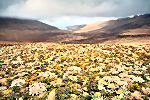 A University of Queensland-led international study released today reports catastrophic declines in wilderness areas around the world over the past 20 years. UQ School of Geography, Planning and Environmental Management and Wildlife Conservation Society in New York researcher Associate Professor James Watson said findings demonstrated alarming losses comprising a 10th of global wilderness since the 1990s. The report discovered that a total of 30.1 million km2 (or 23.2% of terrestrial areas) of the world’s land area now remains as wilderness, with the majority located in North America, North Asia, North Africa, and the Australian continent. An estimated 3.3 million km2 has been lost since the early 1990s (approximately a 9.6% loss in two decades, with the most loss occurring in South America (experiencing 29.6% loss) and Africa (experiencing 14% loss). [1]
A University of Queensland-led international study released today reports catastrophic declines in wilderness areas around the world over the past 20 years. UQ School of Geography, Planning and Environmental Management and Wildlife Conservation Society in New York researcher Associate Professor James Watson said findings demonstrated alarming losses comprising a 10th of global wilderness since the 1990s. The report discovered that a total of 30.1 million km2 (or 23.2% of terrestrial areas) of the world’s land area now remains as wilderness, with the majority located in North America, North Asia, North Africa, and the Australian continent. An estimated 3.3 million km2 has been lost since the early 1990s (approximately a 9.6% loss in two decades, with the most loss occurring in South America (experiencing 29.6% loss) and Africa (experiencing 14% loss). [1]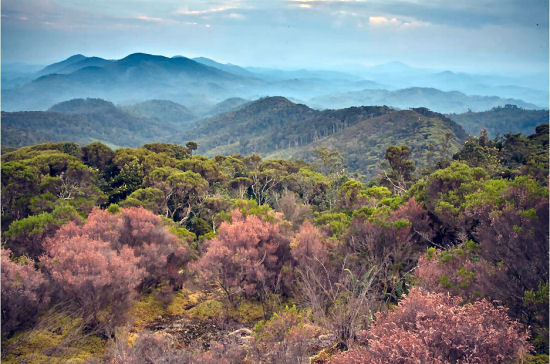
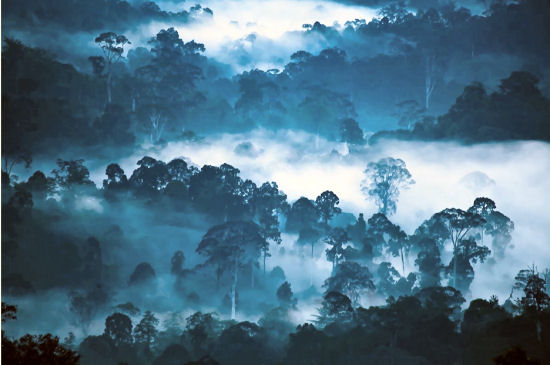
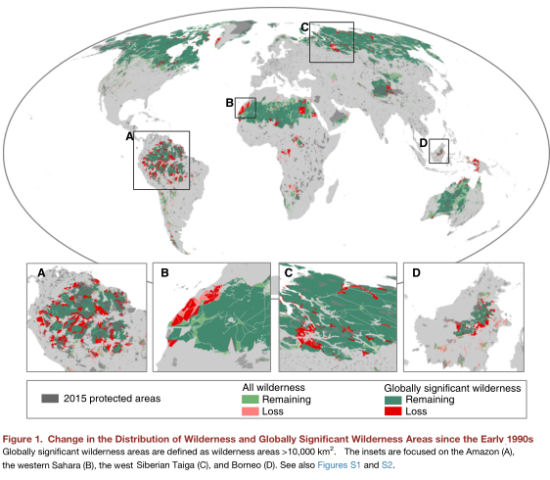

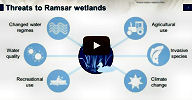 "The governance, coordination and oversight of the management of Ramsar sites must improve overall for Victoria to effectively meet its obligations. Monitoring the implementation of management plans also requires improvement. The recommendations are designed to improve gaps in governance, oversight, coordination and monitoring." (Victorian Auditor General)
"The governance, coordination and oversight of the management of Ramsar sites must improve overall for Victoria to effectively meet its obligations. Monitoring the implementation of management plans also requires improvement. The recommendations are designed to improve gaps in governance, oversight, coordination and monitoring." (Victorian Auditor General)
 On Friday 9th September 2016, Hillary Clinton called people who would vote for Donald Trump, “racist, sexist, homophobic, xenophobic, Islamaphobic.” Now, where have we heard those words together before? Ah, yes, from Moveon.org,
On Friday 9th September 2016, Hillary Clinton called people who would vote for Donald Trump, “racist, sexist, homophobic, xenophobic, Islamaphobic.” Now, where have we heard those words together before? Ah, yes, from Moveon.org, 

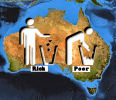 Australia may have the world’s highest debt to GDP ratio. We have the lowest ranking in the region (61st) for income security. Our social expenditure is behind Greece, Portugal, Spain and Italy's. The OECD has ranked Australia second last in government funding of public education.
Australia may have the world’s highest debt to GDP ratio. We have the lowest ranking in the region (61st) for income security. Our social expenditure is behind Greece, Portugal, Spain and Italy's. The OECD has ranked Australia second last in government funding of public education.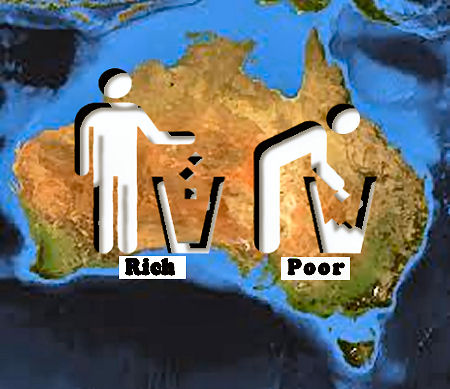 The treasurer, Scott Morrison, has just informed us that we have had 25 years of economic growth and the economy is now growing at its fastest pace in four years, meaning we may well set a new record for the longest period of sustained growth.
The treasurer, Scott Morrison, has just informed us that we have had 25 years of economic growth and the economy is now growing at its fastest pace in four years, meaning we may well set a new record for the longest period of sustained growth.  Syria’s ambassador to the United Nations has dismissed as flawed the findings of a UN-mandated investigation blaming Syrian forces for the use of chemical weapons, saying the report is based on “false testimonies.” Amazingly, the conclusions of the report “lack any physical evidence, whether by samples or attested medical reports that chlorine was used.”
Syria’s ambassador to the United Nations has dismissed as flawed the findings of a UN-mandated investigation blaming Syrian forces for the use of chemical weapons, saying the report is based on “false testimonies.” Amazingly, the conclusions of the report “lack any physical evidence, whether by samples or attested medical reports that chlorine was used.” Singer and keyboard player, Michael Bayliss writes about this song from the digital album he performs with Scott Andrews,
Singer and keyboard player, Michael Bayliss writes about this song from the digital album he performs with Scott Andrews, 
 You are deep in an enjoyable conversation when suddenly a loud blustering person arrives, diverting all the attention of your group to her. She shows no curiosity as to what you were discussing before she arrived, relating a story about herself as though assuming everyone had been waiting for her arrival to come alive ..
You are deep in an enjoyable conversation when suddenly a loud blustering person arrives, diverting all the attention of your group to her. She shows no curiosity as to what you were discussing before she arrived, relating a story about herself as though assuming everyone had been waiting for her arrival to come alive ..
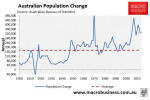 One of the most profound changes affecting the Australian economy and society over the past 12 years has been the massive lift in Australia’s net immigration, which surged from the mid-2000s and is running at roughly twice the pace of long-run norms (see next chart).
One of the most profound changes affecting the Australian economy and society over the past 12 years has been the massive lift in Australia’s net immigration, which surged from the mid-2000s and is running at roughly twice the pace of long-run norms (see next chart).


 "Apeman" by The Kinks - from the album "To The Bone" (With Lyrics) inside. Today we had a chance meeting with another population activist and we got to talking about music and songs about overpopulation. Here is one he reminded us of. We hope to talk about this subject more and introduce more songs. Please write in with your ideas. Music and lyrics are a way of conveying political messages but the mainstream media screens out almost everything except love songs and most of them don't even mention contraception. ;-)
"Apeman" by The Kinks - from the album "To The Bone" (With Lyrics) inside. Today we had a chance meeting with another population activist and we got to talking about music and songs about overpopulation. Here is one he reminded us of. We hope to talk about this subject more and introduce more songs. Please write in with your ideas. Music and lyrics are a way of conveying political messages but the mainstream media screens out almost everything except love songs and most of them don't even mention contraception. ;-) George Soros funded and orchestrated the refugee crisis in Europe, opening the gates to allow refugees and terrorists into the continent. Soros’s agenda has always been about destroying national sovereignty and national borders.
George Soros funded and orchestrated the refugee crisis in Europe, opening the gates to allow refugees and terrorists into the continent. Soros’s agenda has always been about destroying national sovereignty and national borders.  The Honourable Jeff Kennett AC, former Victorian Liberal Premier, promotes multiculturalism. In particular in public, “Multiculturalism is good for jobs.” But he had never revealed other reasons. Speaking to a well-heeled audience of Melbourne’s planning elite - another group keen on high immigration for the increased housing demand - he said more. He disclosed that he has a low opinion of Australian workers, and so prefers migrants instead. They work harder, for less; so they are better for businesses.
The Honourable Jeff Kennett AC, former Victorian Liberal Premier, promotes multiculturalism. In particular in public, “Multiculturalism is good for jobs.” But he had never revealed other reasons. Speaking to a well-heeled audience of Melbourne’s planning elite - another group keen on high immigration for the increased housing demand - he said more. He disclosed that he has a low opinion of Australian workers, and so prefers migrants instead. They work harder, for less; so they are better for businesses.  This article looks at some of the AID organisations/NGOs influenced by Soros funding. The reader will recognise that many are involved in foreign wars, as in Syria. There is a problem when AID organisations take sides and SOROS funded ones tend to take sides.
This article looks at some of the AID organisations/NGOs influenced by Soros funding. The reader will recognise that many are involved in foreign wars, as in Syria. There is a problem when AID organisations take sides and SOROS funded ones tend to take sides. 
 Inside see Syrian Girl's excellent video report on how the media has played reporting on Syria, using children's photos. She really explains the details well and her video contains footage that I have not seen before and new information.
Inside see Syrian Girl's excellent video report on how the media has played reporting on Syria, using children's photos. She really explains the details well and her video contains footage that I have not seen before and new information.


 A 12 year old boy's beheading, although videoed, has gone almost unreported by the mainstream media. But a photograph of a 5 year old boy seated in an ambulance has achieved international coverage. What do these two media events have in common? The photo-journalist, Mahmoud Raslan, was present at both. It is alleged that Raslan is a member of the Nouredin al-Zinki movement of US-funded terrorists who beheaded young Abdallah Issa, whom they accused of collaborating with the Syrian Army. Apart from the sheer horror of these machinations, the important point to be made is that western mainstream news went out of its way to publicise one photo, but buried another far more shocking act, because it was performed by United States supported 'rebels'. Now the iconic photo of Omran Daqneesh takes us straight to the one of poor Abdallah Issa, which pro-United States media, which takes its orders from the Whitehouse, would rather sweep under the carpet.
A 12 year old boy's beheading, although videoed, has gone almost unreported by the mainstream media. But a photograph of a 5 year old boy seated in an ambulance has achieved international coverage. What do these two media events have in common? The photo-journalist, Mahmoud Raslan, was present at both. It is alleged that Raslan is a member of the Nouredin al-Zinki movement of US-funded terrorists who beheaded young Abdallah Issa, whom they accused of collaborating with the Syrian Army. Apart from the sheer horror of these machinations, the important point to be made is that western mainstream news went out of its way to publicise one photo, but buried another far more shocking act, because it was performed by United States supported 'rebels'. Now the iconic photo of Omran Daqneesh takes us straight to the one of poor Abdallah Issa, which pro-United States media, which takes its orders from the Whitehouse, would rather sweep under the carpet.

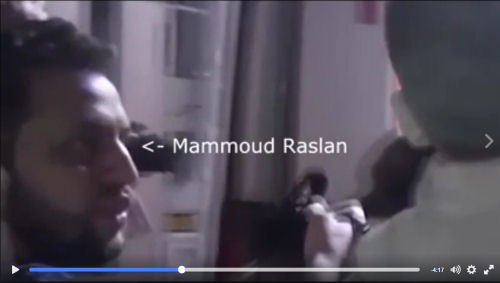
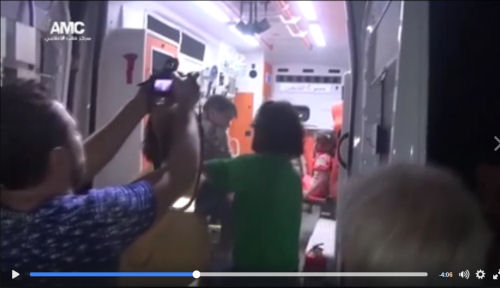
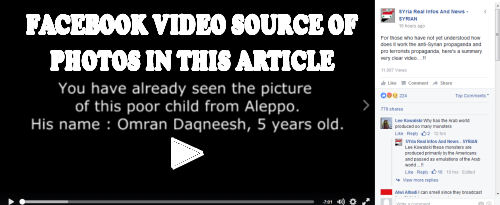
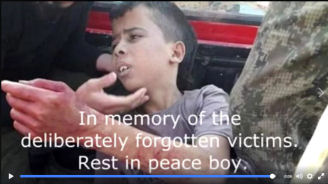
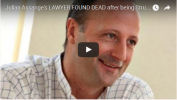 Suspicious circumstances have been denied by the police but this very successful lawyer, John Jones, QC, who has been involved in trying to save Gadaffi's son from execution as well as in protecting Assange, who is promising to reveal evidence that will see Mrs Clinton behind bars, somehow was struck and killed by a train - at the age of 45. There is very little information about this. "Disturbing news since the DNC made a public TV announcement that Julian Assange should be assassinated! Julian plans to leak a Hillary CLinton email in October before the US presidential election, that aims to put Hillary CLinton behind jail bars," writes MLordandGod.
Suspicious circumstances have been denied by the police but this very successful lawyer, John Jones, QC, who has been involved in trying to save Gadaffi's son from execution as well as in protecting Assange, who is promising to reveal evidence that will see Mrs Clinton behind bars, somehow was struck and killed by a train - at the age of 45. There is very little information about this. "Disturbing news since the DNC made a public TV announcement that Julian Assange should be assassinated! Julian plans to leak a Hillary CLinton email in October before the US presidential election, that aims to put Hillary CLinton behind jail bars," writes MLordandGod. 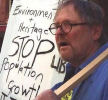 When your party is going off the rails, don't you have the right to shout out the windows for help? Geoff Dowsett is a member of the Hornsby Kur-in-gai Greens' Population and Sustainability Reference Group. He has been growing increasingly concerned about the failure of the Greens to take the issue of environmental sustainability seriously and make positive changes to their population policy. Geoff’s resulting activism on the issue of population numbers in Australia has been received by some Greens members with hostility. He is not the first and will not be the last Green to
When your party is going off the rails, don't you have the right to shout out the windows for help? Geoff Dowsett is a member of the Hornsby Kur-in-gai Greens' Population and Sustainability Reference Group. He has been growing increasingly concerned about the failure of the Greens to take the issue of environmental sustainability seriously and make positive changes to their population policy. Geoff’s resulting activism on the issue of population numbers in Australia has been received by some Greens members with hostility. He is not the first and will not be the last Green to 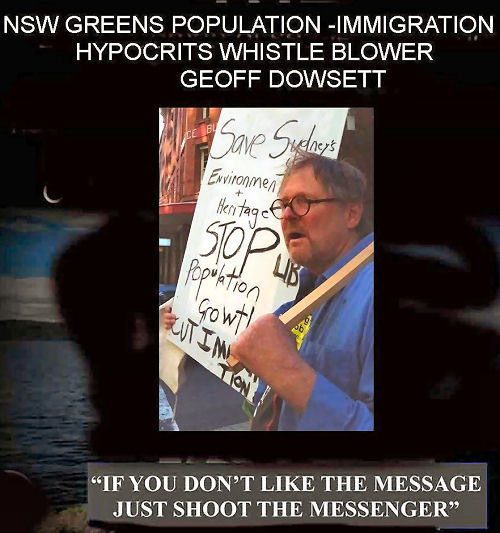
 Mary Drost is the convenor of Planning Backlash, a group with a network of 250 residents' groups, which last year held the biggest ever population awareness function in Australia. Recently VCAT issued a very limited survey for users to fill out. Many of the 250 residents' groups in Planning Backlash were formed through bitter experience of appealing to the law via VCAT. Here is what Mary Drost has to say, in her frank and concise manner.
Mary Drost is the convenor of Planning Backlash, a group with a network of 250 residents' groups, which last year held the biggest ever population awareness function in Australia. Recently VCAT issued a very limited survey for users to fill out. Many of the 250 residents' groups in Planning Backlash were formed through bitter experience of appealing to the law via VCAT. Here is what Mary Drost has to say, in her frank and concise manner. 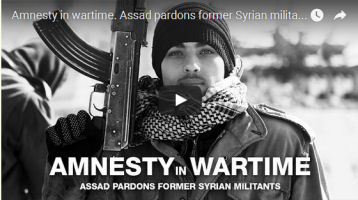 Video documentary of army training and interviews with former enemies of the Syrian Army who have sought amnesty and now train to fight for Syria: "On several occasions since 2011, Syria’s President Bashar al-Assad has offered amnesty to anti-government militants who lay down their arms. Amnesties are usually offered to former combatants after are conflict ends, in Syria though they’re being granted as the war rages on. Men who haven’t completed their mandatory military service, are returned to the Army and serve in special “Amnestied groups” where they will fight with the government forces they once opposed.
Video documentary of army training and interviews with former enemies of the Syrian Army who have sought amnesty and now train to fight for Syria: "On several occasions since 2011, Syria’s President Bashar al-Assad has offered amnesty to anti-government militants who lay down their arms. Amnesties are usually offered to former combatants after are conflict ends, in Syria though they’re being granted as the war rages on. Men who haven’t completed their mandatory military service, are returned to the Army and serve in special “Amnestied groups” where they will fight with the government forces they once opposed. Why has a Greens Population/Sustainability Working Group Member been vilified as racist and sexist and harassed with threats of expulsion for sticking up for our wildlife against needless rapid population growth? Read what Geoff Dowsett wrote and the response he got from candidate Tamara Ryan (included in the article).
Why has a Greens Population/Sustainability Working Group Member been vilified as racist and sexist and harassed with threats of expulsion for sticking up for our wildlife against needless rapid population growth? Read what Geoff Dowsett wrote and the response he got from candidate Tamara Ryan (included in the article).
 Stone objects collected by prehistoric hunters were effective as throwing weapons to hunt animals, research at Leeds Beckett University reveals.
Stone objects collected by prehistoric hunters were effective as throwing weapons to hunt animals, research at Leeds Beckett University reveals.

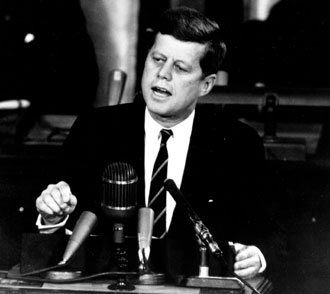
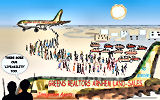

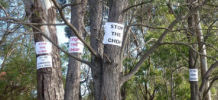 Greens Councillors Amanda Stone, Sam Gaylard and Misha Coleman voted together with Councillors Stephen Jolly and Jackie Fristacky to give the go ahead to run a cycle path through a natural reserve. Trees will be felled. This was not a foregone result, since the decision was carried only by one in a 5:4 vote. The Greens obviously had a choice, but seem to have chosen to put transport ahead of nature in a very overcrowded area with little access to natural surroundings. This lack of interest in protecting the natural world and our access to it from overdevelopment seems to be an increasing feature of the Greens, particularly to the North of the Yarra.
Greens Councillors Amanda Stone, Sam Gaylard and Misha Coleman voted together with Councillors Stephen Jolly and Jackie Fristacky to give the go ahead to run a cycle path through a natural reserve. Trees will be felled. This was not a foregone result, since the decision was carried only by one in a 5:4 vote. The Greens obviously had a choice, but seem to have chosen to put transport ahead of nature in a very overcrowded area with little access to natural surroundings. This lack of interest in protecting the natural world and our access to it from overdevelopment seems to be an increasing feature of the Greens, particularly to the North of the Yarra. 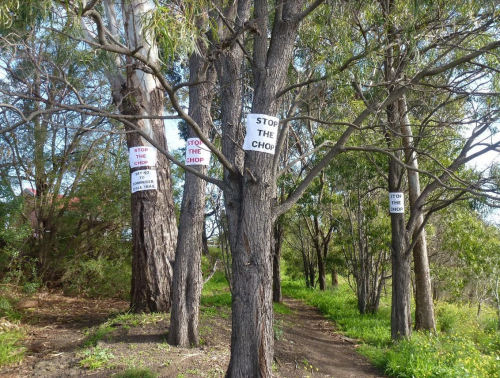
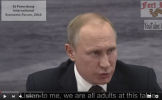 Video and translation: This comment by Putin, about United States aggression and its abandonment of protocol to limit the risk of nuclear destruction, was made to representatives of various media outlets during the St Petersburg International Economic Forum, in June 2016. It was filmed and has been translated by Inessa S and we have imbedded the video in the article with her translation. It seems particularly timely to publish this in the wake of the release of Hillary Clinton's lost emails. "Nobody has anything to gain from a nuclear stand-off against Russia. The power hungry decision-makers are few in number, but powerful enough to have subverted mainstream media to misrepresent Russia as the main threat to international security." (Vladimir Putin).
Video and translation: This comment by Putin, about United States aggression and its abandonment of protocol to limit the risk of nuclear destruction, was made to representatives of various media outlets during the St Petersburg International Economic Forum, in June 2016. It was filmed and has been translated by Inessa S and we have imbedded the video in the article with her translation. It seems particularly timely to publish this in the wake of the release of Hillary Clinton's lost emails. "Nobody has anything to gain from a nuclear stand-off against Russia. The power hungry decision-makers are few in number, but powerful enough to have subverted mainstream media to misrepresent Russia as the main threat to international security." (Vladimir Putin). What are we to make of Hillary Clinton's emails, recently revealed by Wikileaks? Here we examine the first two that were released. "In my view Clinton is as mad as a cut snake. You will see through these documents that the emphasis is entirely on Israel's interests, not America's, and whatever she thinks they are not the same. Of course she is completely in the hands of the Zionist lobby, as was Australia's recent Prime Minister Gillard, who lent her services to the Clinton campaign. But then Clinton is in the hands of anyone with money and the power to swing votes. She talks of Israel's security dilemma. Well, that's a good one: a state with an estimated 200-400 nuclear weapons (yes, a couple would be enough) facing states without even one has a security dilemma? ..." (Earth to Earth, Turkey.)
What are we to make of Hillary Clinton's emails, recently revealed by Wikileaks? Here we examine the first two that were released. "In my view Clinton is as mad as a cut snake. You will see through these documents that the emphasis is entirely on Israel's interests, not America's, and whatever she thinks they are not the same. Of course she is completely in the hands of the Zionist lobby, as was Australia's recent Prime Minister Gillard, who lent her services to the Clinton campaign. But then Clinton is in the hands of anyone with money and the power to swing votes. She talks of Israel's security dilemma. Well, that's a good one: a state with an estimated 200-400 nuclear weapons (yes, a couple would be enough) facing states without even one has a security dilemma? ..." (Earth to Earth, Turkey.)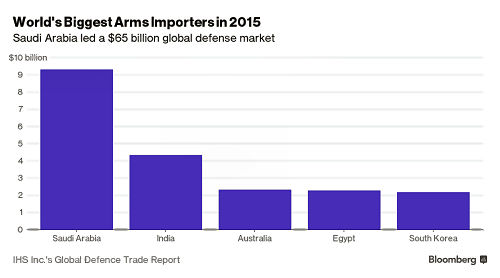
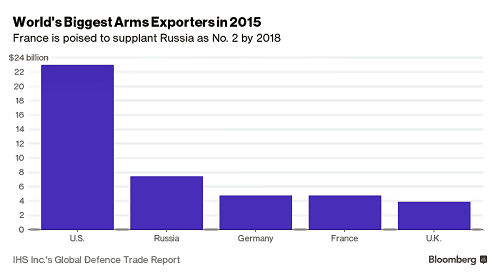
 The cruise industry is just as shameless as the rest of the shipping industry.
The cruise industry is just as shameless as the rest of the shipping industry. 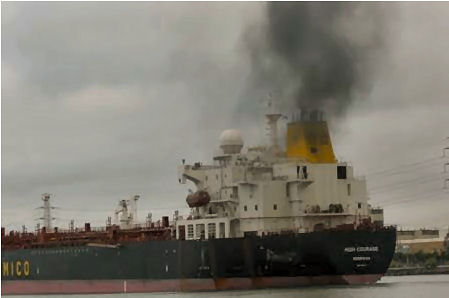
 Co-author of Climate Code Red and the author of the 2015 Breakthrough paper Striking Targets, seasoned Melbourne based environmental campaigner, Philip Sutton, is known for his comprehensive and well-researched presentations.
Co-author of Climate Code Red and the author of the 2015 Breakthrough paper Striking Targets, seasoned Melbourne based environmental campaigner, Philip Sutton, is known for his comprehensive and well-researched presentations.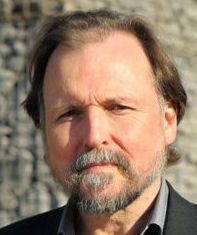
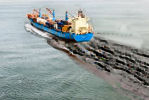 If you think aviation emissions are bad, the even bigger problem is the unregulated shipping industry.
If you think aviation emissions are bad, the even bigger problem is the unregulated shipping industry.
Recent comments